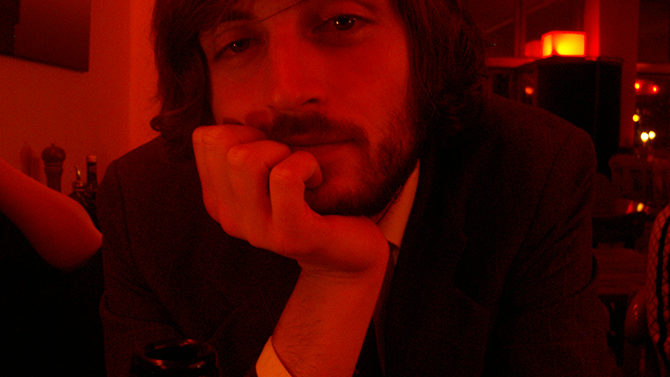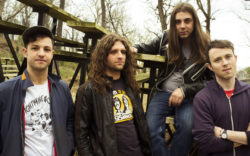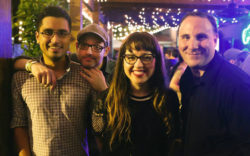Welcome to Behind the Scene, a biweekly series where Flagpole and Dirtty Toe Productions profile the people who work offstage to make Athens music matter.
WHO HE IS: Drew Vandenberg
WHAT HE DOES: Sound engineer, Chase Park Transduction
WATCH:
Flagpole: How did you wind up as an engineer?
Drew Vandenberg: I kind of knew exactly what I wanted to do when I was 14 or 15 years old. I knew I wanted to become a recording engineer. When I was old enough to drive, my high school girlfriend at the time, her dad was chair of the printmaking department. Long story short: Her dad knew Velena [Vego, talent buyer at the 40 Watt], and I called and got an internship with Velena. I just wanted to get into the music business somehow. I filled out ticket orders, put up flyers, stuff like that. I told her what I really wanted to do, and she’s friends with David [Barbe, owner of Chase Park Transduction]. I called David and I started interning here when I was in high school. So, I’ve been working here for 12 years.
What are some of the records that you’ve been involved with?
I’ve worked on a lot of records at this point, either as an assistant engineer or as an intern, or just as the engineer or producer. I’ve worked on two Futurebirds full-lengths—Hampton’s Lullaby and Baba Yaga—as well as on an EP and a live album with them. In terms of mixing, I worked on of Montreal’s Paralytic Stalks and Lousy with Slyvianbriar, which I also recorded. I mixed the Kishi Bashi record 151a and I mixed the new Kishi Bashi record that is about to come out. In some capacity, I’ve worked on four Drive-By Truckers records… I worked as an assistant engineer on Deerhunter’s Halcyon Digest and Weird Era Cont. I’ve worked mixing two Dent May records, Do Things and Warm Blanket. I also worked on recording and mixing Ra Ra Riot’s Beta Love. There’s a lot of stuff I’m missing.
Can you describe your daily routine?
I always try to be at the studio by 11 a.m. It just depends wildly from there on what I’m working on—if I am mixing, or recording, or mastering, or whatever it is. It depends on if I’m in the middle of a long-term project. If so, then I’m kind of picking up where I left off the day before, but it could be one-off mixing two songs for somebody on a 7-inch. In that case, I’m going to get here, turn on the gear, get everything hooked up kind of the way I like it.
If I wanted to be the big man on the record, then I would have written the songs; it would be my record. You’re behind the curtain for a reason, and I think you should realize that going in.
There are so many engineers that work here. Sometimes, you come in and it can be set up very neutrally for the next person. So, you have to get things set up the way you want and patched in the way you want. I roll from there. I usually work 11 a.m. to midnight, with a dinner break around 6:30 p.m.
Do you think the average music listener is aware of your job?
I don’t think so. It never even occurred to me until I was looking at liner notes as a kid that this was a job. I didn’t know how music was recorded. With people now and the way electronic music is made, sometimes it doesn’t even involve people like me—they are their own engineer or producer. I don’t think people think about it, except for maybe huge-name producers. But that’s kind of the point, in a way. If I wanted to be the big man on the record, then I would have written the songs; it would be my record. You’re behind the curtain for a reason and I think you sort of realize—well, you should realize that going in. If you don’t realize that, you’re in for a rude awakening.
Is there any record that you’d say is career-defining for you up to this point?
Well, there are a few things. When I was mentioning the survey of things that I’ve worked on, I left out a glaring one. There’s this guy that lives out in California. His name is Chaz [Bundick], but he has a band called Toro Y Moi, and I mixed Underneath the Pine for him, which is his second record. I’d say that record, in a way, gave me a lot of exposure. People, frequently, cite that as something that they like. Same thing with the two of Montreal records. And Futurebirds. I’d say those three things get me a lot of phone calls and emails from people from all around the country.
On the opposite end of the spectrum, there is a Thayer Sarrano record I worked on, which is her first record. I think this was four years ago. In a different way, that exposed me on a local level more. Working on that record with Thayer when I first got back to Athens is how I became re-integrated into the Athens music scene and met all these people who are my great friends now. It slowly led bit by bit to working on more records.
What makes a record a success?
I always make a cheesy metaphor: You are the paintbrush and you are the extension of the artists expressing themselves. Your job is to try and help them create whatever they want to create through your technical knowledge and your musical knowledge. At the end of the day, if they’re happy… that’s my marker. If they’re happy and if it sounds and feels good, then I am happy. There is the occasional time, in a band environment, where one person’s not happy.
So there are sessions that don’t go so well?
I’m not going to name names, but I’ve seen people fuckin’ lose it before. Big time, yell and scream at people. I’ve seen people cry. I’ve seen people shout. It changes your perspective the first time you see all of these things, but after the fact, you realize that making a record can be a very emotionally explosive experience. It’s people’s inner expressions. When you think about it like that, it is a very sensitive thing. Especially if there are inner-band politics where people have been working together for so long, it can be like brothers or sisters fighting. It can be really raw and emotionally intense. But most of the time, everyone walks out of the door happy and it is all forgiven. It’s just in the moment, that’s part of creating something. Sometimes, shit gets really, really tense.
What advice would you give to bands working with engineers like yourself?
If it’s a rock and roll band, then I would say, “Make sure you come in well rehearsed and be well organized.” There’s always room for spontaneity to form new ideas in the studio. But, especially for bands on a budget, it is very important to be well rehearsed, because if you’re not, you’re just going to blow a bunch of time. Maybe do some pre-production. Get together and discuss ideas that you might want to do for overdubs or different things like that just to save time and save your money.
Sometimes, shit gets really, really tense.
I’m happy to sit here and record all day and all night if you want to spend four days getting one take of one song. But really, that’s not how you should do things. That’s just a waste of time and money. Very few great records are made that way. I would just say, “Be well-practiced. Be well-organized.”
Do you find it difficult to listen to records without thinking about the engineering and production?
It really depends on where my head’s at. If I’m in work mode and I just got home from work, I can’t really listen to music… unless I really just want to listen to something radically different from what I was just working on. Sometimes I will be working on a rock record and then I will go home and listen to instrumental, electronic music that is so far away that it relaxes your brain from thinking about it.
It does get difficult turning it on and off sometimes, but I still enjoy music very, very much. On my days off, I still listen to a ton of records. But, that does get difficult, too. People send me a lot of demos or rough mixes or things I am going to be working on in the future. Actually, tons of my time is taken up just listening to more music. It’s work. But it’s not a bad thing, either. It’s stuff I want to work on, so it’s still interesting. There are tons of records, like my old favorite records, that I can just put on and not think about it. I love them regardless. A lot of the records I love become more interesting to me the longer I do this, because I think about them in a different way.
Like what you just read? Support Flagpole by making a donation today. Every dollar you give helps fund our ongoing mission to provide Athens with quality, independent journalism.










